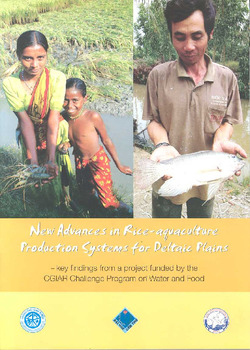New advances in rice-aquaculture production systems for deltaic plains: key findings from a project funded by the CGIAR challenge Program on water and food

Citation
Bangladesh Fisheries Research Institute; Can Tho University; Research Institute of Aquaculture, Vietnam (2007). New advances in rice-aquaculture production systems for deltaic plains: key findings from a project funded by the CGIAR challenge Program on water and food. The WorldFish Center. Dhaka, Bangladesh. 17 p.
Forty per cent of the world population is settled in coastal zones, where much of industrial needs and world's food are produced. The influence of the sea on the environment and human livelihood is not restricted to the coastline- and mangrove belt. Indeed, its influence can be found up to 50 km further inland. Brackish water creates an environment in which continuous and dynamic flux impinges upon the stability of agricultural production systems and concomitant livelihood strategies. Most common management interventions fail to recognize the diversity of rural livelihoods in the coastal zones, and the environmental consequences for water quality and aquatic biodiversity. To address the diverse stakeholder interests and complex multi-scale upstream-downstream interactions, the Challenge Program on Water and Food Number 10 (CPWF #10) project started in 2004 with the aim of developing appropriate rice-aquaculture production systems to increase land and water productivity for improved food security and livelihoods suited to the different environments across the land water interface of two deltaic plains; the Mekong River Delta (Vietnam) and Indus-Gangetic Delta (Bangladesh).
Permalink
Date Available
Type
Publisher
Copyright
CC BY 4.0
Research Themes
Topics
Language